OLYMPIA, Wash. — As the holiday travel season approaches, Gov. Jay Inslee and representatives from major airlines are reassuring travelers that their health and safety are top of mind amid the coronavirus pandemic.
While domestic air travel at airports including Sea-Tac is up from the lows when COVID-19 first struck, it's still about 70% below where it was last year. But could rapid COVID-19 testing, telling airlines and their passengers that everybody on the plane is negative, help get people back in the air?
The question was posed to leaders from Alaska and Delta Airlines and the Port of Seattle Thursday during a press conference with Inslee.
"The recent surveys that we’ve conducted with our passengers, they’re overwhelming saying that, rapid testing is something they would like to see us do at the airport," said Lance Lyttle, managing director for the aviation division of the Port of Seattle. "That’s why we’re talking to multiple vendors, multiple service providers to see how we would actually provide that type of service."
United Airlines announced Thursday it would be the first U.S. based airline to offer COVID-19 tests to its passengers. Starting Oct. 15, the tests will be offered at San Francisco International Airport so passengers flying to Hawaii won't have to undergo a two-week quarantine when they arrive. The cost of the test is reported at $250.
Other airlines including Germany’s Lufthansa, which like United serves Sea-Tac International Airport, is also reported to be ready to begin rolling out the rapid COVID-19 test for first-class and business passengers, providing results in 15 minutes.
"Last week, the state of Hawaii announced it would allow people to come in and vacation with a COVID test," said Max Tidwell, vice president of Alaska Airlines. "That’s a sign that things are opening up, are starting to stabilize."
While the rapid test is not available on every airline yet, leaders from Alaska and Delta airlines, and the Port of Seattle, joined Inslee Thursday to lay out the steps being taken on the ground and in the air to keep travelers and employees from getting sick.
“COVID has fundamentally changed our travel experience but one thing remains the same is how we care and prioritize safety,” said Tidwell.
Airline passengers are required to wear face masks on Alaska and Delta flights. Both airlines are also reducing capacity on flights and blocking middle seats to adhere to social distancing guidelines. Delta said it will block middle seats through Jan. 6, 2021.
So far, Delta has banned about 300 passengers from flights for not wearing face masks, according to Tony Gonchar, regional vice president for Delta Airlines. In addition, those passengers get placed on a no-fly list. Earlier this year, Alaska Airlines also started enforcing its no mask, no travel rule for all adults.
Gonchar announced Thursday that starting Oct. 1, Delta Airlines will initiate a temperature screening pilot program for travelers leaving Sea-Tac Airport. Passengers will walk by a thermal camera to check their temperature and if they have a temperature at or above 100.4, they will be placed on a no-fly restriction for 14 days. That pilot program will operate Mon.-Thurs. from 5 a.m. to noon.
Lyttle, with Port of Seattle, also spoke Thursday about the new protocols the airport has implemented to help protect passengers.
Face masks are required for travelers and employees inside the airport, and there is signage encouraging social distancing, as well as barriers between passengers and employees. The Port is also working to integrate as much touchless technology as possible to limit the number of surfaces passengers have to come in contact with. Crews are also disinfecting high touch areas on a regular basis.
Inslee said these baseline protocols like mandatory face masks, social distancing, and protective barriers are being implemented not just at Sea-Tac.
"The steps we’re taking will help protect those who need to fly," said Inslee. “This guidance isn’t just about SeaTac — these requirements apply to airports across the state — Pullman, Spokane, Tri-Cities and Everett too."
All airports in the state need to have their safety protocols in place, if they don't already, by Oct. 1.
The airline leaders' promises of safety come as several airlines are trying to recover from the economic losses due to the pandemic.

